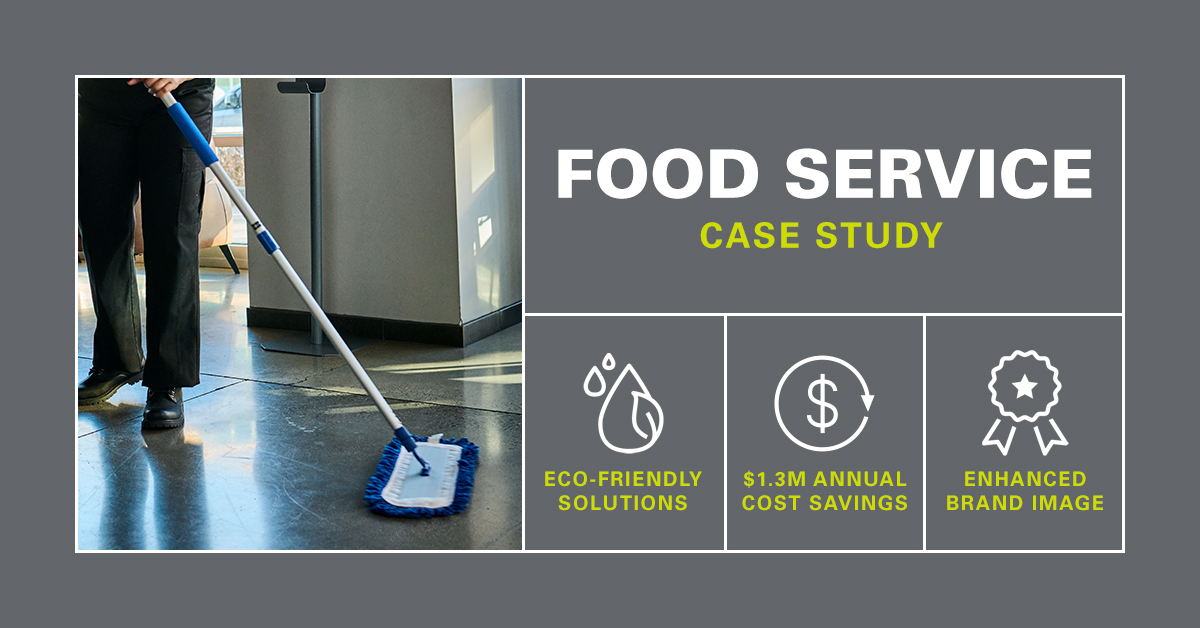Summary:
Challenge: Uncontrolled spending and brand misalignment
With each of its 700+ restaurants managing individual purchasing, the company faced significant inefficiencies. This decentralized model created several problems:
- HIGH COSTS
Lack of volume pricing for cleaning supplies, including disposable mops, led to inflated acquisition costs. - PRODUCT INCONSISTENCY
Non-standardized products, especially floor cleaning tools, meant varying levels of cleanliness and safety across locations. - INEFFICIENT OPERATIONS
Local managers spent valuable time on procurement rather than focusing on their core responsibility: the customer experience. - LACK OF OVERSIGHT
The company had no centralized way to track spending or analyze the value of its facility service purchases. - BRAND DISCONNECT
The practice of purchasing and discarding thousands of disposable wet mops weekly conflicted with the chain’s strong commitment to environmental responsibility, non-toxic cleaning, and waste reduction.
The chain needed a solution that would not only cut costs but also standardize its cleaning practices with high-performance, sustainable products like microfiber mops, which are known for their superior cleaning power and reusability.

Solution: A centralized microfiber mop rental program
As one of the chain’s Chicago locations neared its contract renewal, a store manager contacted UniFirst for a competitive assessment. This initiated a deeper conversation with the UniFirst National Accounts team, who recognized the opportunity to create a streamlined, national program.
The UniFirst team developed a comprehensive proposal to centralize the chain’s facility services, with a focus on implementing a state-of-the-art microfiber mop rental program. This solution was designed to:
- CONSOLIDATE SUPPLIERS:
Leverage the chain’s national footprint to secure volume pricing. - PROMOTE SUSTAINABILITY:
Introduce reusable microfiber mops to eliminate the waste associated with disposable mop heads, aligning with the company’s “green” strategy. - ENHANCE CLEANING STANDARDS:
Provide professionally laundered, high-quality microfiber mops weekly, ensuring every location had effective tools to maintain cleanliness and hygiene. - INCREASE EFFICIENCY:
Centralize purchasing and data access, freeing up local managers and providing corporate oversight on spending and inventory.
The UniFirst program directly addressed the chain’s goals for growth, consistency, and sustainability, offering a clear path to operational excellence without hidden costs.
Impact: Massive savings and a stronger brand
Before UniFirst, the chain’s locations purchased and discarded an average of four traditional wet mops per week, at a cost of $30 per week per location. Projected across 1,000 future stores, this amounted to a staggering $1,560,000 annually.
By switching to UniFirst’s reusable microfiber mop rental service, the cost dropped to just $4 per week per location. This professionally managed program provides clean, absorbent, and effective microfiber mops on a regular delivery schedule. The impact was immediate and substantial.

